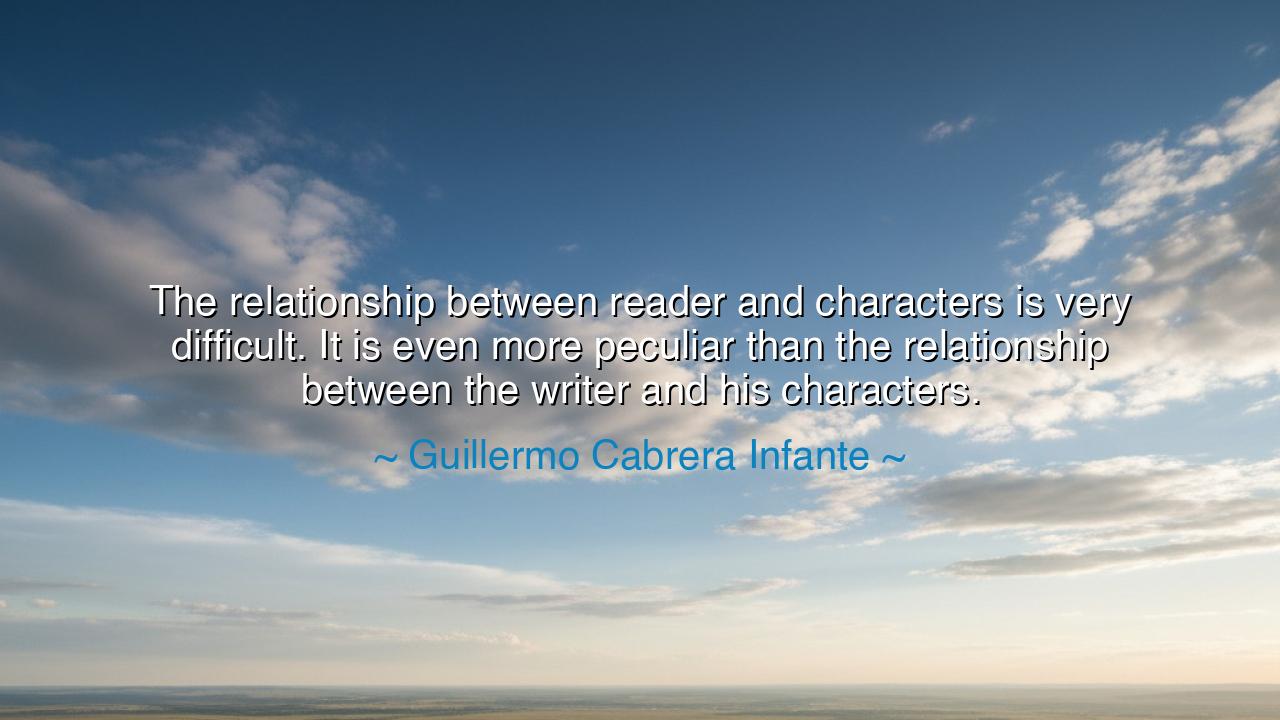
The relationship between reader and characters is very
The relationship between reader and characters is very difficult. It is even more peculiar than the relationship between the writer and his characters.






Hear the profound reflection of Guillermo Cabrera Infante, who declared: “The relationship between reader and characters is very difficult. It is even more peculiar than the relationship between the writer and his characters.” These words unveil the mysterious bond that exists within the realm of storytelling, a bond woven from imagination, desire, and unspoken truths. For the connection between reader and characters is not forged by creation, as with the writer, but by interpretation — a meeting of hearts across the veil of words.
The writer is like a divine artisan, shaping his characters from the clay of thought and breath. He knows their origins, their hidden flaws, and their destined paths, as a potter knows every curve of the vessel he has made. Yet the reader, approaching the tale from afar, does not create but discovers. The reader breathes life into the characters anew, forming them in the secret chambers of the mind. In this way, no two readers ever behold the same soul, for each gaze carries its own vision.
This is why their relationship is so peculiar and so difficult. The reader both loves and judges the characters, embracing them as companions while knowing they are not truly real. It is a dance of closeness and distance, longing and frustration, for the reader seeks to understand completely what can never fully be grasped. The writer, by contrast, possesses certainty, yet remains forever apart — a creator who cannot step inside his own creation.
Thus, Cabrera Infante’s words remind us that storytelling is a sacred triangle of writer, characters, and reader. Without the reader, the tale remains silent, and without the characters, there is no tale at all. But when this delicate balance is honored, a kind of magic awakens: strangers across time and space are bound together by shared dreams, and the world of the page becomes, for a moment, as real as life itself.






TTtung le thanh tung
I agree with this sentiment. The reader’s connection to a character can be incredibly personal, shaped by their own life experiences and emotions. This makes the relationship with a character more subjective than the writer’s, who has control over their creation. But does that mean that the character belongs more to the reader than the writer? Or is it more about the interaction between both perspectives, creating a shared understanding?
DPdaisy pham
I find this quote fascinating because it suggests that the relationship between the reader and character is almost an unspoken bond. We, as readers, often know characters better than the writer might have intended. But could this also lead to misinterpretations or overly personal connections? How do you think this complexity impacts our understanding of the story as a whole?
YNLe Thi Yen Nhi
This quote makes me think about how the emotional investment readers have in characters can sometimes be more intense than what the writer might feel. As readers, we often grow attached to characters, feeling their joys, pains, and struggles. Is it possible that readers 'own' characters in a way that makes their relationship with them even more intense and complicated than what the writer originally intended?
UGUser Google
I can see how the relationship between the reader and the character might be more complex than that of the writer and their creation. When reading, we project our own emotions and experiences onto characters, and they become personal to us in a way that the writer might not have intended. Does this mean that every reader’s experience with a book is unique? Can a character ever truly be 'understood' in a singular way?
QKTa quoc khanh
This quote raises an interesting point. As a reader, it’s fascinating how we can sometimes feel more attached to characters than the writer might. It makes me wonder—do characters truly belong to the writer, or do they evolve in the minds of readers, taking on a life of their own? Can a reader’s interpretation of a character differ so much from the writer’s intentions that it forms a unique relationship?